Food Artisans and Farmers Speak Out For a Food Hero
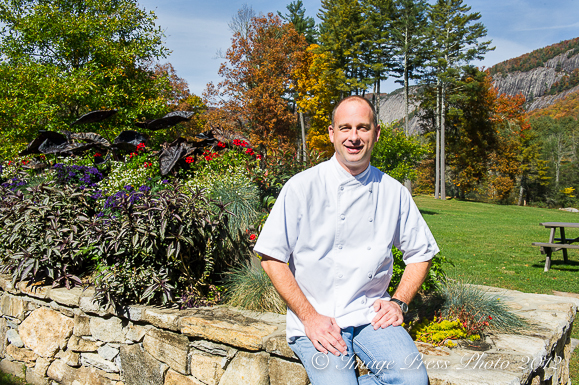
To quote Brigham Young – A good man, is a good man, whether in church, or out of it.
My husband and I traveled the back roads of Tennessee and North Carolina this year with the intent of writing a story about the best of the region’s food artisans and farmers. While their stories were inspiring and we have already written several articles, there was a much larger and quite unexpected story that emerged.
There is a backstory in the culinary world about a chef that has quietly impacted the lives of so many chefs, farmers, and artisans in the Southeast. In today’s culinary world dominated by chefs and individuals seeking recognition for their own work, Chef John Fleer has always been the spokesperson for others. This is a story of how one individual can enter a person’s life, cause a turning point, inspire a career, create a new path, or accelerate the one they were on.
Fleer received his degree in the humanities from Duke University and was pursuing his master’s degree at the University of North Carolina with the plan to become a minister when his passion for Southern foods and cooking was ignited. The food he experienced at Magnolia Grill in Durham, North Carolina the year he graduated from Duke “was fun food, interesting food, food I recognized, and I was blown away.” This experience combined with an increasing interest in cooking eventually led him to an extreme shift in careers and to the Culinary Institute of America (CIA), trading in a pulpit’s robe for a chef’s jacket.
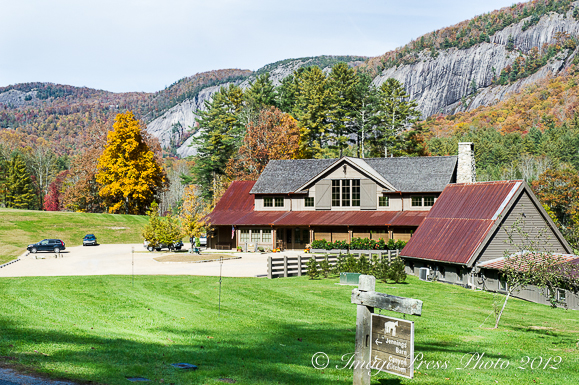
John Fleer opened Canyon Kitchen at Lonesome Valley in Cashiers, North Carolina in 2009
John Fleer was the executive chef at Blackberry Farm in Walland, Tennessee from 1992 to 2007 and has been the executive chef of Canyon Kitchen at Lonesome Valley in Cashiers, North Carolina since 2009. Fleer joined Blackberry Farm after graduating from the CIA in 1992. At that time, Blackberry was an upstart mountain retreat with an ambition to become one of the finest destination resorts in the United States. Owner, Sandy Beall, upon hiring Fleer, charged the new chef to translate his vision for the property into a culinary vision and serve it on the plate. Fleer’s focus was on rustic, yet refined, Southern cuisine. He developed recipes that incorporated regional ingredients sourced primarily from the foothills of the Smoky Mountains and other parts of Appalachia. He called it, “Foothills Cuisine.”
“When I graduated from culinary school and went to Blackberry Farm I had Southern sensibilities. I wanted to do Southern food and to do Southern food, you have to have Southern ingredients. It’s that simple. You seek them out.” Fleer would often visit local farms and markets in search of unique and extraordinary ingredients. “My cooking reflects my heritage, but it also reflects some of the other things I have done in my life.”
Here are the stories of some of the lives and places that Fleer has touched as well as some of his culinary contributions.
Allan Benton – Smoky Mountain Country Hams
Benton’s Smoky Mountain Country Hams is housed in a modest building on busy Highway 411 in Madisonville, Tennessee. Entering the retail store, you are instantly taken back to the 1960s as the establishment has changed little over the years. The air is filled with the overwhelming smoky aroma of cured meat. It is from this small building that Benton’s prized hams and bacon are smoked, aged, and shipped to chefs across America. It is also where locals come to shop, chat, and see friends. Allan Benton, who has become known as the king of bacon told us, “I can promise you that no one would have ever heard of me if John had not started using my products. John singlehandedly changed my life and got my name out there to chefs. I would not be in business without him.”
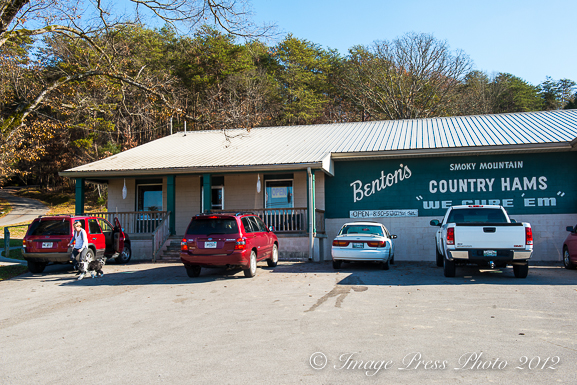
Benton’s Smoky Mountain Country Hams
Fleer modestly added, “My relationship with Allan is longer than with anyone else and goes back to the beginning at Blackberry Farm. Allan will remember that first telephone call. I called to talk to him about his product and place an order. He was so impressed that there were other uses for his ham besides serving it for breakfast. He used to have a covered pick-up truck and would deliver to Cracker Barrel-like places in Gatlinburg. Blackberry was on the way, so he could deliver. To this day, he cures his meats and does business the old-fashioned way. He continues to use his old rotary phone.”
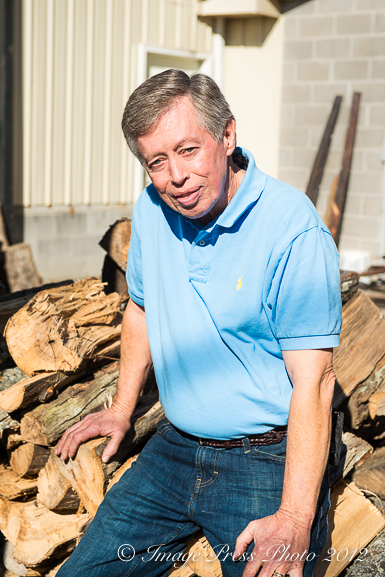
Allan Benton
“I was trying to sell twelve-month hams for the same price others were selling eighty-day hams in Gatlinburg and I was literally starving,” Allan told us. “When John started using my product and sharing it with some of the best chefs in the country visiting Blackberry Farm, these chefs would get home and my phone would be ringing and asking, ‘Can you sell me this?’ ”
Early in his tenure at Blackberry Farm, and as part of Fleer’s culinary vision for the property, he invited guest chefs from around the country to cook with him. “They were the chefs I wanted to meet and work with,” he said. While they were in town, Fleer introduced them to and had them work with Benton’s products and those of other regional producers, including Muddy Pond Sorghum, Sunburst Trout, and Tennessee Truffles. “The chefs would also see the walk-in and the pantry. We all peer into each other’s closets, so to speak, to see what tricks and products we are using. One of the biggest things was the buttermilk from Cruze Farm. ‘You don’t use Sealtest? What the heck is this?’ they would ask.”
As a token of appreciation for their time spent at Blackberry Farm, the visiting chefs were given gift packages of local products like Benton’s Country Ham or bacon and small jugs of Muddy Pond Sorghum, taking these products far beyond the foothills of Tennessee.
Colleen Cruze – Cruze Farm
Talk about Cruze Dairy Farm in Knoxville, Tennessee, and Chef Fleer smiles. “Colleen is a second-generation farmer that believes in what the family has done for the last twenty years and wants to take the tradition further. She’s not a hobby farmer who wants to grow pretty vegetables. How many twenty-year-olds want to do this?” And she does it with great flair, delivering and sampling the farm’s dairy products in gussied up farm girl garb while introducing the next generation of chefs to their buttermilk.
Fleer’s relationship with Earl and Cheri Cruze (Colleen’s parents) goes back to his early years at Blackberry Farm. “There is a buttermilk culture in this region. The Breakfast of Champions, if you are daring, is a bowl of cornbread and raw onions with buttermilk poured over it. The combination of buttermilk and mushy cornbread is delicious, ” he told us. Could this be regional hangover food? Fleer says it probably wouldn’t hurt.
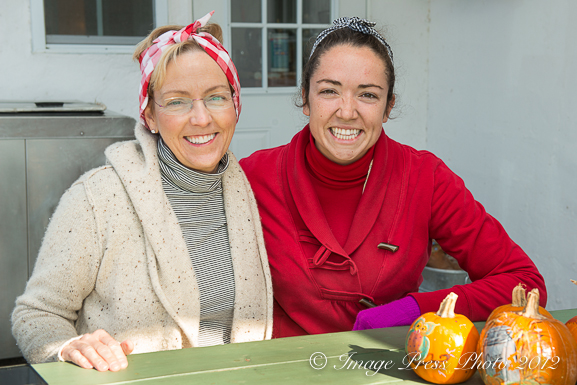
With Colleen Cruze at Cruze Dairy Farm in Knoxville, Tennessee
Fleer uses Cruze’s buttermilk in almost everything and features it as much as possible. Known as the king of buttermilk by friends and other chefs, he told us, “They have great products and if you use the heck out of them on the menu, they continue to get bigger.” On our recent visit to Cruze Farm, Yuki (one of the Japanese interns working on the dairy farm), saw a picture of John Fleer on the computer and shouted “Buttermilk!” I guess that says it all.
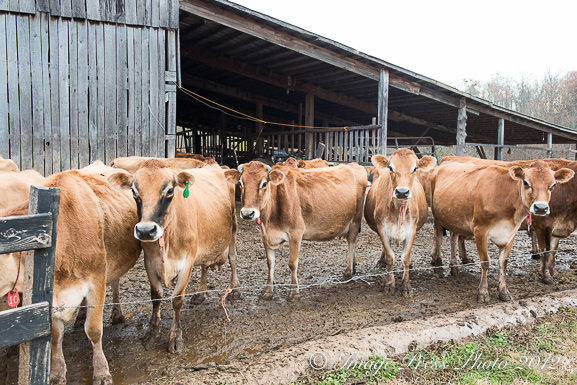
Jersey Girls
“John was finding and using local ingredients before it was trendy,” Colleen told us. “He took an interest in us and made my mother deliver to Blackberry Farm. It was a long distance. He kept pushing my mom to keep making it and to bring it. He was able to get chefs and others to realize that our buttermilk is different than what you purchase in the grocery store. He has a huge commitment to our local products.”
Fleer’s commitment to farmers and artisans goes beyond using their products. He shared this story about Cruze Farm: “Cruze had 400 extra gallons of buttermilk they had overproduced. Colleen called and said she was headed to Charleston to sell some of it. I told her I would make some connections in Asheville with the chefs. The next day, I helped her deliver around town.” Colleen told us, “John is such a nice guy. I told my boyfriend that he reminds me of him. I hope that he will be that kind of husband and father one day.” (Colleen and her boyfriend are now engaged as of New Year’s Eve, 2012.)
The buttermilk craze has expanded far beyond Appalachia. Cruze Farm was recently featured in publications such as Garden & Gun, The New York Times, and Southern Living, to name a few.
Mark Guenther – Muddy Pond Sorghum Mill
“I found Muddy Pond Sorghum in the same place I first discovered Cruze’s buttermilk,” Fleer told us. “It was a Farmstand grocery store called the Horn of Plenty in Maryville. I didn’t grow up with the tradition of sorghum, but then you get a little tickler of something that’s important to the culture and you begin to find out how vast the story is. So few people do it the right and the old-fashioned way.”
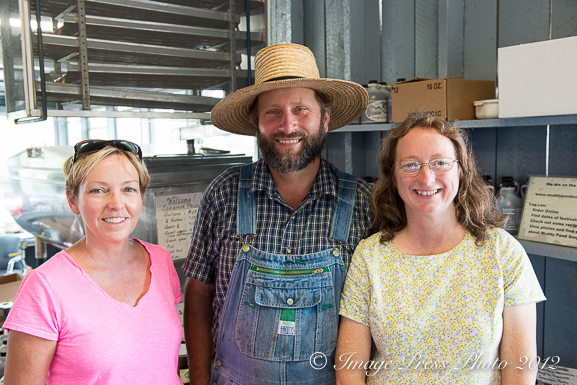
With Mark & Sherry Guenther at Muddy Pond Sorghum Mill in Monterey, Tennessee
In the mid-1990s, Mark and Sherry Guenther of Muddy Pond Sorghum noticed that sales had been increasing over a period of time. Then Mark received a call from Chef Fleer asking if Blackberry Farm could buy sorghum directly from him. “It opened the doors for us with a tremendous audience using our product,” he told us. “I didn’t realize the reputation and the connections of Blackberry Farm. Business exploded for us and then other places started to contact us and use our sorghum.” Fleer shared, “Mark and Sherry are smart folks. They made small replicas of their one-gallon jugs.” These are the small bottles that went home with visiting chefs and guests at Blackberry Farm.
The Guenther family and Muddy Pond Sorghum were awarded one of the most prestigious culinary honors in the United States, a Made in America: President’s America Treasures Award in July 2012.
Tom Michaels – Tennessee Truffles
Domestically grown black périgord truffles were all but unheard of in the United States until Tom Michaels of Tennessee Truffles in Chuckey, Tennessee planted his truffière. Tom had contacted Fleer at Blackberry Farm several times asking him to try his truffles, but Fleer had used other domestic truffles and was disappointed. He told Tom, “If they can’t get it right in Oregon, how can it possibly be done in Tennessee?” However, one day Tom asked to stop by and Fleer agreed. That was the winter of 2004.
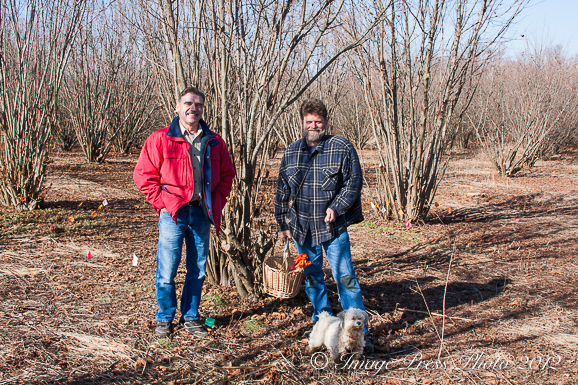
Tom Michaels (left) truffle hunting at Tennessee Truffles in Chuckey, Tennessee
Tom told us, “I was just a little old farmer trying to grow these darn things (a humble comment, given that he has a Ph.D. in plant pathology and did his dissertation on truffles and mushrooms). I really didn’t give much thinking to the culinary end of marketing them. I had two chefs using them in Knoxville at the time. My third sale was to John Fleer who I thought was thinking, ‘Oh yeah, he’s some hick or hayseed from the woods growing truffles,’ but then I went in with my containers.”
- Fleer recalls, “Tom showed up one day with his little Tupperware containers filled with rice and black truffles. He had a dozen or so and asked if he could open them and let us smell and taste them. He opened them up and I knew, that was a truffle.” Joseph Lenn, who trained with Fleer and is now executive chef of The Barn at Blackberry Farm, also recalls the moment. “When Tom opened the containers, the kitchen came to a standstill.” The pungent aroma of black truffles consumed the kitchen and there was no denying that this Tennessee farmer had produced black gold.
Michaels and Tennessee Truffles were honored with a Made in America: President’s America Treasures Award in July 2011.
Sean Brock – Husk and McCrady’s – Charleston, South Carolina
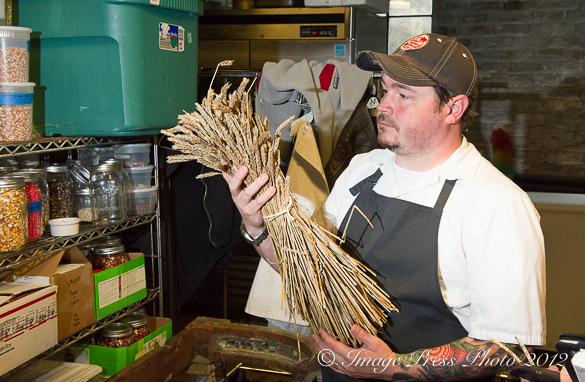
Chef Sean Brock in Charleston, South Carolina
Many chefs in the Southeast who have worked with John Fleer over the years have been inspired by his vision. Sean Brock is one of them. Winner of the James Beard Award for “Best Chef Southeast” in 2010 and nominated for the James Beard “Outstanding Chef” award in 2012, Brock was excited to talk about Fleer. “John Fleer headed up the early movement of preserving Southern traditions. I begged him to let me work at Blackberry Farm when I was nineteen or twenty years old. I looked up to him. He was one of my first mentors and one of the few chefs I could talk to about ingredients I grew up with (in Appalachia) like cushaws and pawpaws. He has a traditional manner of cooking, but with a modern side. He is one of those people that can see much further into the future. He is an unsung hero.”
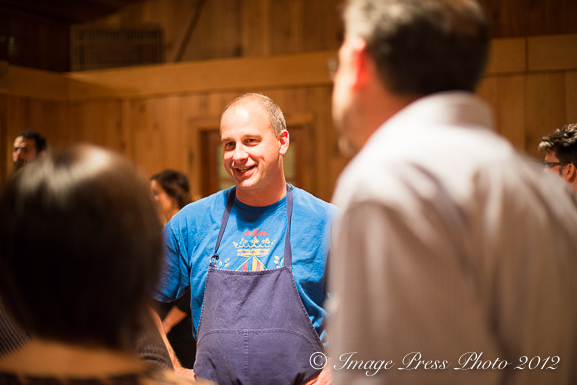
Chef Fleer at a Blind Pig Supper Club dinner in Leicester, North Carolina
Fleer, speaking of his support for these artisans said, “I have always seen it as part of my mission to be a champion of these people and I feel like I have done a good job. Not because I wanted to make them famous, but it was important that people knew there was something and someone behind the product. I didn’t do anything except continue to use the products and to tell people about them. Hopefully, I represented the products as they were intended and maybe took them to another level while respecting the integrity of the people and the product.”
Fleer’s profound culinary contribution has been through helping others be successful, rather than trying to bring recognition to himself. Would we have heard of these people without John Fleer’s culinary vision for Foothills Cuisine that he created twenty years ago, honoring and supporting the artisans that produce extraordinary ingredients in the Smoky Mountains and Appalachian region? Would the legacy of Foothills Cuisine be what it is today had Fleer not developed the original recipes, sourced these products, and hired and trained the current chefs at Blackberry Farm, and created the guest chef program?
Blackberry Farm has continued the tradition of using artisan products in Foothills Cuisine and has evolved the program over the years. They have brought many artisan specialties, such as cheesemaking, truffles, charcuterie, heirloom seed preservation, and even brewing craft beers, in-house. Blackberry Farm was also a recipient of the Made in America: President’s America Treasures Award in July 2012.
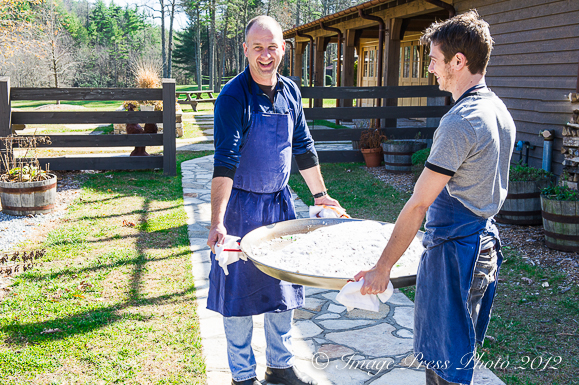
Prepping for the Seven Fires Dinner in Highlands, North Carolina
Tom Michaels of Tennessee Truffles said it well, “John Fleer is the hidden Rasputin of the culinary world here in the Southeast. He has formed so many ideas and brought along so many chefs and farmers.”
John Fleer became an early evangelist for promoting and preserving the legacy and integrity of America’s regional foods. He has inspired the next generation of chefs to do the same; chefs like Sean Brock, who have taken up the cause with artisans like Glenn Roberts of Anson Mills, to focus on preserving heirloom seeds and ingredients.
While there are many chefs joining this call, it is imperative that more people in the culinary world take up the cause for these real food heroes: our farmers and artisans that produce traditional and heirloom products. Without our support, these food traditions and products may be lost forever. As Brock said, “Five years ago this conversation would not have happened. The most important thing is to preserve Southern cooking and ingredients.” John Fleer has been at the forefront of this movement.
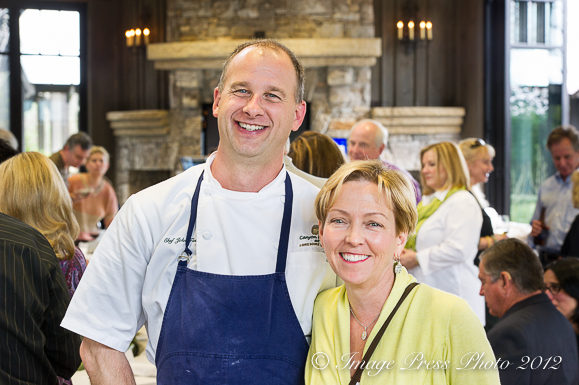
With Chef John Fleer
Author’s note: Chef Fleer was not aware that this article was being written about him. I interviewed him with the intent of gaining his perspective for an article to be written about the various artisans.
Here are the articles we have published on several of these artisans and farmers:
The challenge of preserving our culinary heritage is not limited to the United States. Here is another article on preserving culinary traditions and artisans in Friuli, Italy:
D’Osvaldo, Prosciutto di Cormòns
Chef Fleer has shared a recipe for his Savory Buttermilk Panna Cotta which combines two of his best-loved ingredients, Cruze buttermilk, and Benton’s eighteen-month aged ham.
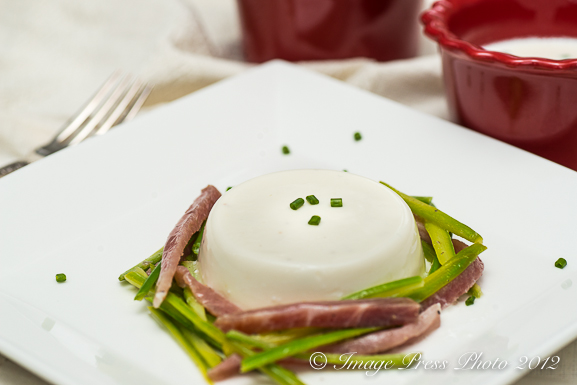
Savory Buttermilk Panna Cotta
* An update – John is now the chef/owner of Rhubarb and Benne on Eagle in Asheville, North Carolina.
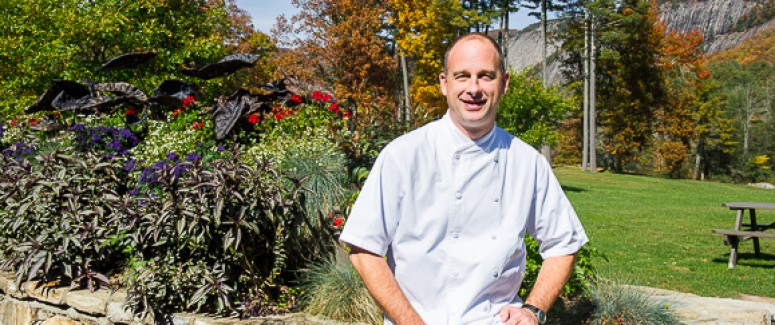
Savory Buttermilk Panna Cotta
Ingredients:
For panna cotta:
1 Package powdered gelatin
1/4 cup water
1 1/2 cup Half & Half
Freshly cracked black pepper (sift to remove any large pieces)
1 teaspoon Kosher Salt
1 1/2 tablespoons sugar
2 teaspoon finely cut chives
1 cup Cruze buttermilk (substitute another good buttermilk if you do not have access to Cruze Farm’s products)
2 tablespoons crème fraiche or sour cream
1 bunch of fresh Asparagus
Thinly sliced Benton’s eighteen-month Tennessee prosciutto
For Muscadine Vinaigrette:
2 cups muscadine wine
2 teaspoons kosher salt
1 teaspoon Dijon mustard
1 tablespoon lemon juice
1 teaspoon fresh cracked pepper
1/2 cup grapeseed oil
1/4 cup hazelnut oil
Directions:
For panna cotta:
1. Bloom gelatin in room temperature water.
2. Bring Half and Half, sugar, salt, and pepper to a simmer. Remove from heat and whisk in bloomed gelatin and crème fraiche. Whisk until gelatin is melted.
3. Whisk in buttermilk and chives. Taste for seasoning. Fill 6 3-ounce molds. Place in refrigerator over night. (Best if made a day ahead so that they may set up.)
For asparagus:
1. Cut tips off (3 inches), blanch, quarter. Peel and blanch the middle section and slice paper thin.
For vinaigrette:
1. Reduce wine to 2/3 cup and allow reduction to cool. Stir in mustard, lemon juice, salt, and pepper. Whisk in oils and check seasoning.
For assembly:
1. Sprinkle thinly sliced asparagus stems on top of panna cotta. Place panna upside down in center of salad plate. Using torch, lightly heat up mold so that the panna comes out smoothly. Dress asparagus tips and juilenned country ham with muscadine vinaigrette.